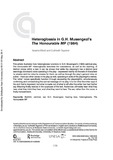Please use this identifier to cite or link to this item:
https://cris.library.msu.ac.zw//handle/11408/1326| Title: | Heteroglossia in G.H. Musengezi's the Honourable MP (1984) | Authors: | Mboti, Nyasha Tagwirei, Cuthbeth |
Keywords: | Bakhtin, carnival, ear, G.H. Musengezi, hearing loss, heteroglossia, The Honourable MP |
Issue Date: | May-2014 | Publisher: | Routledge | Series/Report no.: | Critical Arts: South-North Cultural and Media Studies;Vol. 28, No. 2, p.178-198 | Abstract: | This article illustrates how heteroglossia functions in G.H. Musengezi’s (1984) satirical play, The Honourable MP. Heteroglossia describes the coexistence, as well as the clashing, of distinct voices within a text. It can be shown that while the playwright has a distinct (and seemingly dominant) voice operating in the play – expressed mainly via the sets of characters he creates and the roles he creates for them, as well as through the play’s general mise en scène – there are other voices in the play as well, operating in spite of the playwright’s wishes. The ‘other’ voices specifically function through exceeding the playwright’s, simultaneously confirming and contradicting the central message of the play. It is not what the writer says in the end that is important, but what is made out of what is left after the writer has had his/her say. Meaning finally resides in the surpluses of the text. Audiences ultimately hear what they hear, what they think they hear, and what they want to hear. The ear, rather than the voice, is finally transcendent. | URI: | http://dx.doi.org/10.1080/02560046.2014.906339 http://hdl.handle.net/11408/1326 |
ISSN: | 0256-0046 |
| Appears in Collections: | Research Papers |
Files in This Item:
| File | Description | Size | Format | |
|---|---|---|---|---|
| Cuthbeth Tagwirei- Hetroglossia in Honourable MP.pdf | Abstract | 333.04 kB | Adobe PDF |  View/Open |
Page view(s)
62
checked on Apr 20, 2025
Download(s)
12
checked on Apr 20, 2025
Google ScholarTM
Check
Items in MSUIR are protected by copyright, with all rights reserved, unless otherwise indicated.



